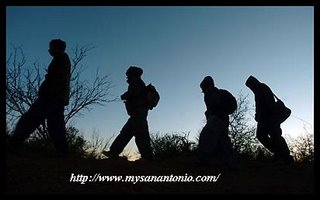
Photo courtesy of The Ragens.com
Philippians 1:15-17 (New King James Version)
“Some indeed preach Christ even from envy and strife, and some also from goodwill: The former preach Christ from selfish ambition, not sincerely, supposing to add affliction to my chains; but the latter out of love, knowing that I am appointed for the defense of the gospel.”
Last Saturday the Gazette published the following letter from Rita Stark, a fellow Emporian:
“I hate to write letters to the editor. I really do. They do nothing to endear me to this community of conservatives, but you know what? Somebody has to do it.”
“There has been some terminology bandied about of late regarding the “Christian war” on people who don’t see things 100 percent their way. These people also say that America is a “Christian nation.” Now this runs contrary to what I learned in Mrs. Follett’s class back in 1963. Mrs. Follett said this is a nation of many faiths, and that everyone’s ideas are welcome here.”
“Now Mrs. Follett was a pretty good Christian, but she didn’t make a big deal about it. She got along with everybody, and like most people back in those days, she figured school was a place to learn and church was a place to pray. I don’t know this for a fact, but I imagine she said “Merry Christmas” to Christians and “Happy Hanukah” to Jewish people.”
“Now I realize that 75 percent of the people in this nation are Christian, and that many of you thing that makes this a Christian nation. Like it or not, however, we have that darn Constitution, which prohibits the establishment of a national religion. If I remember right, Mrs. Follett venerated that Constitution right up there with her Bible and the “board of education” on her desk.”
“There is a movement in this country right now that a lot of people are unfamiliar with, led by Pat Robertson, Tim LaHaye and others, some of its les well-known goals are to bring about Armageddon and a return to Biblical law, including stoning for women who have had abortions, homosexuals, and, presumably anyone who sasses back in any way. Sermon-on-the-mount Christians like Mrs. Follett need to educate themselves about the Dominionist movement, because unfortunately, they have the full support of the Bush administration and most of the conservative media. Do not be misled into aiding the establishment of an American Taliban. Educate yourself.”
“I am certain that Mrs. Follett would have wanted nothing to do with the Dominionists, and neither should any good American.”
After I read the letter I was tempted to respond in haste, to respond in kind. I figured that if Ms. Stark could engage in logical fallacy (taking the part for the whole), I could do likewise. If she could paint conservative Christianity with the broad brush of “dominionism”, I figured I could use my brush to paint Ms. Stark as a member of a sinister cabal of “distortionists.”
After a few days of breathing and living, however, I decided, as much as I possibly could, to take the high road. I started by agreeing with some of what she’d written and used that as my springboard in an attempt to butt heads without being a butthead. Last night I sent my response to the Gazette. I hope I succeeded in what I was attempting to do. My response follows. Let me know if I did:
Mrs. Follett taught Rita Stark some very valuable lessons back in 1963. I’m conservative and I agree that this is a land of many faiths. While I don’t agree that all ideas are welcome, or equal (sedition, advocating infanticide, etc.), I do believe there is plenty of room for public expressions of faith and philosophy, including some that are unpopular. As Roman Catholic scholar Richard John Neuhaus once observed “In a democracy that is free and robust, an opinion is no more disqualified for being “religious” than for being atheistic, or psychoanalytic, or Marxist, or just plain dumb.”
Like Mrs. Follett, I also have a deep and abiding respect for our Constitution. I too oppose the establishment of a national religion. That respect, however, does not mean that I accept the notion that government can mandate where, when, or how “we the people” express our religious sentiments. In other words, our government can no more mandate religious neutrality than it can mandate national religion, stoning, or Armageddon.
Eighteenth century statesman Edmund Burke greatly admired our Revolution, principally because it made room for Divine Providence in the affairs of men. In so doing, he believed, America had overcome the error of Europe, which was “blindness to the effulgence of the burning bush, deafness to the thunder above Sinai.”
I believe that Mrs. Follett would agree with me that the right to express one’s faith is our national cornerstone. I support that right for Muslims, Buddhists, Hindus, Zoroastrians, and atheists. I believe Mr. Follett would also support my right as a conservative, Pentecostal Christian to express mine in the public square.
In keeping with that wisdom, I intend to continue doing so. To do otherwise would only encourage a secularized version of the Taliban to take that right from me.
Phil Dillon
Emporia, Kansas
Technorati tags for this post:
Christianity
Dominionism
Edmund Burke
Religion


